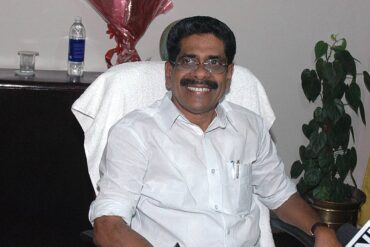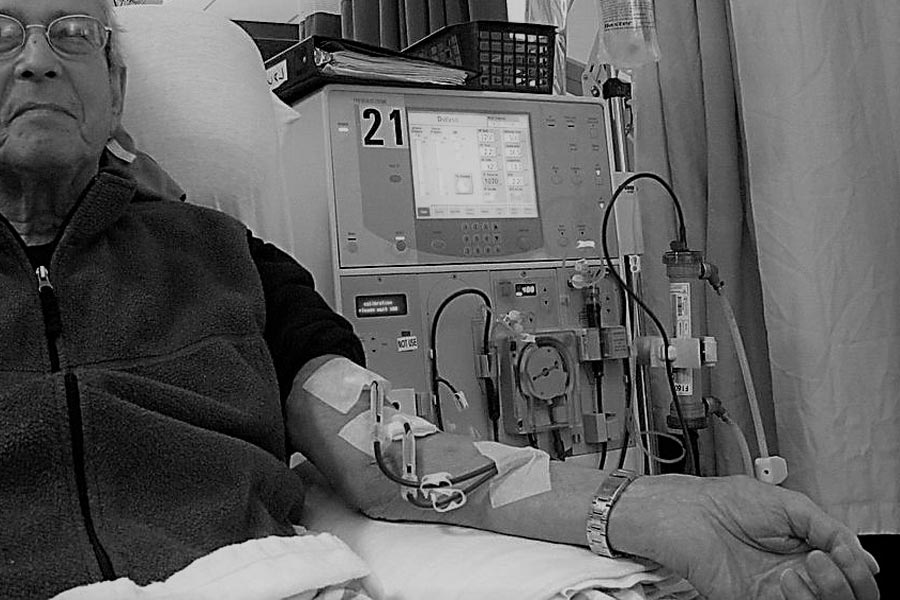Often families have to make tough decisions while a dear one is undergoing treatment for a terminal illness. And most often the crucial factor governing the decision for enhanced treatment could be a financial one. Unable to cough up more money the families sometimes give up on their dear ones. Medical personnel, hospital managements and the government need to put their heads together to promulgate measures that would make life less cumbersome for families of patients who are improving with treatment but lack the financial clout to take the treatment to its entirety. Government and societal support system may help them in their hour of need.
As a doctor working in the ICU tending to patients who’ve undergone surgery, I was caught between the devil and the deep sea recently. I was involved in the treatment of a 51-year old lady who had received treatment in various hospitals for pancreatic cancer, for which her family had already spent a fortune. She had come to us for surgical rectification of a complication that had arisen as fallout of an operation she had undergone earlier. Not in the best of health, having been in and out of hospitals for quite some time, she was not in an ideal physical condition to undergo another major surgery, which was however imperative. After surgery she suffered a setback on the form of heart failure, which almost placed her at death’s door. Prompt intervention including ventilation saw her improving over subsequent days, much to her treating doctors’ gratification.
Just as we thought that she was turning the corner, her husband demanded that all treatment be withheld. He claimed to have ‘exhausted all resources treating his wife for years’. Though it was a tough decision, which he was guilty about, he had no option but to give up on his wife for want of resources to continue with the treatment.
This isn’t an isolated incident. Modern Medicare isn’t cheap anymore. It inflicts huge financial burden on families, irrespective of their financial wherewithal. While healthcare personnel go about the difficult preposition of treating patients who need to surmount many an odd, their families run from pillar to post raising money to pay mounting bills.
In India where healthcare insurance does not measure up to patients’ needs, doctors are often asked to ‘stop treatment’, which could be easily complied with patients who’re over the hill, for whom treatment is futile, but is a catch twenty two situation medical personnel, hospital managements and the government need to formulate certain measures to assist these weary patients and their families.
Aren’t there ways and means whereby families who find money hard to come by are able to provide affordable, yet effective treatment for their near and dear?
Healthcare facilities
Statistically, healthcare facilities in the public sector far exceed those in the private sector, especially those in the corporate sector by sheer number. Those in the government sector provide much cheaper healthcare than those in the private sector. As the result, it is to the former that a large number of India’s sick, especially those belonging to the economically wanting section of society approach seeking medical care. Paradoxically, ‘cheaper facilities’ existing in public hospitals are unable to measure up to the quality of treatment provided in private facilities. This is not entirely due to the paucity of facilities alone. There is a glaring incongruity between work culture that exists among the personnel manning healthcare facilities in the public and private healthcare facilities. While ‘work to rule’ work ethics is the rule in government facilities, healthcare workers in the private sector are ready to walk that extra mile for patients, especially the sicker ones, who demand dedicated and undivided attention.
This must change. Besides, there is paucity of facilities and advanced technology that aid both in diagnostic and therapeutic purposes in the public sector. The common excuse citied for the government healthcare lacking adequate facilities is ‘paucity of funds with the government’. Healthcare isn’t a priority for the government, which only spends less than 1% of the GDP for healthcare dispensation. To circumvent dependence on government funds to spruce up public healthcare facilities to which the poor approach for their health needs, a viable option is to levy nominal consultation fees for just outpatient consultations alone in the government hospitals.
States like Kerala which has significant leftist political influence had once attempted to do this, but had to backtrack, as it was met with determined opposition from left-leaning political forces. It will take a committed political will to put this in place. Considering the humongous numbers of patients seeking outpatient consultation in public hospitals, the kind of money that can be generated from a nominal fee could be substantial enough to fund the respective hospitals’ modernization.
If people willingly spent huge amounts of money on booze and cigarettes, which only spell doom on their health, it is also their responsibility to spare some money for their health needs. Politicians fight attempts to charge services in public hospitals for their narrow-minded political gains. Monitory self-sufficiency alone can pull public healthcare sector from the depths of dismal existence in apparent squalor.
Medical insurance
Healthcare in India is greatly handicapped by lack of a buoyant insurance industry, like how it exists in the West. Though there are large numbers of agencies offering ‘health insurance’ to the public, they are known to foot-drag on processing claims and even refuse disbursement of claims which the insured rightfully deserve for the premium paid on insurance. Insurance companies look out for loopholes or excuses to withhold disbursement of claims, on flimsy excuses taking the insured for a ride. This sector needs to be pulled up and regulated, as medical insurance is, on many occasions, the only source of money people, especially the insured (theoretically) have to fall back on, to pay hospital bills. The insured must at least be provided a platform to voice their grievances on the insurance companies’ highhandedness.
Medical reimbursement
Those employed with government and their dependents have their medical expenses are reimbursed. It cannot be denied that this facility is of great help for government servants and their dependents. But on many occasions, this facility is entangled in the red tape. This facility must be made less cumbersome in living up to the financial needs of those who are the entitled beneficiaries of this truly humanitarian facility, in times of great financial stress caused by medical needs.
Private Healthcare facilities
As things exist, private healthcare facilities, especially those in the corporate sector indulge in runaway ‘exhortation’ by fleecing the unfortunate sick who have no option but to cough up money to pay the long bill that pops of billing machines in private hospitals. If there is one segment of healthcare the government needs to shackle is the inhuman fleecing of patients in the name of billing by private hospital managements. The government must also attempt to do away with the practice among private hospitals to demand money as ‘advance’ when patients are admitted to hospitals. This practice is inhumanly followed even in emergencies like road traffic accidents. No person who meets with an accident is expected to land up in hospitals with bloated wallets.
Doctors must step in
Doctors and hospitals must be more forthcoming to oblige to patients’ or their families’ requests for transfer to cheaper healthcare facilities of their choice, if that will help reduce treatment costs.
Government schemes
Government schemes like the ambitious Ayushman Bharat Yogana free Health Insurance Scheme, the brainchild of the incumbent Prime Minister, Narendra Modi, will go a long way to address the financial aspects associated with healthcare needs of the nation’s citizens, especially those who are financially hard-pressed. More such schemes are truly welcome.
Financial Aid
Charity by well-meaning individuals, organizations and clubs must also be encouraged, but with stringent regulation and screening of the needy. Group funding will also go long way to mitigate the financial hardship caused by costly medical needs. Requests through media, both the print and visual are sometimes resorted to by people who have their back to the wall, having lost their worldly possessions in the process of coughing up hospital bills. But, such efforts are sometimes resorted to by unscrupulous elements as means to cheat people to make easy money. Such self-defeating attempts must face the long arm of the law.
Cover Image: Representational image; Pic credit: Wikipedia







